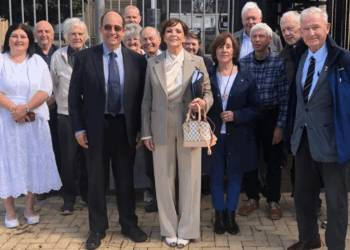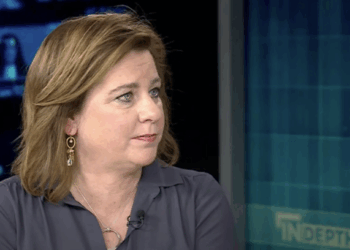Chris Philp is the shadow Home Secretary
Knife crime has reached epidemic levels.
In towns and cities across the UK, people are falling victim to it with alarming frequency – some of them children.
The barbaric knife attack on a train from Doncaster to Cambridge on Saturday took place in this grim context. The stories emerging from the incident are truly horrifying. Some passengers thought it was some kind of Halloween prank – but then found themselves fleeing through the carriages. There was “blood everywhere” and people were being “stamped” on as they sought to escape. Others were forced to hide in toilets.
One thing that also stands out is the heroism of a member of train staff who tried to stop the rampage. He is now fighting for his life. Our first thoughts must be with him and all the other victims of the attack, and their families.
While we wait for more information on exactly what happened and why, we must think about knife crime more broadly, and what we can – and must – do to stop it.
Clearly, the current approach is not working. The first thing we have to do is get better at catching these criminals. And to do that we have to give the police the tools they need. Technology is our friend in this matter. Live facial recognition offers a way to identify wanted criminals and known dangerous offenders, so they can be stopped and prevented from committing crimes. It captures a picture of each person’s face and identifies their key features, before converting it into a unique digital template which is then scanned against biometric data to verify identity.
If there is a match with a wanted criminal or someone with a history of offending, police can then be alerted and take appropriate action.
There is nothing comparable that can be achieved without technology. Police officers are never going to be able to recognise everybody they are looking for at first glance – especially if they have come from another part of the country. And images of passers-by not on the wanted or serious criminal database are immediately and automatically deleted – to deal with concerns about civil liberties.
Live facial recognition should be rolled out in our town centres, and also at train stations, to help police identify the people they need to.
As well as new tools like facial recognition, though, we need to use existing tools that are tried and tested. And none is more important than stop and search.
Some say it is racist, a tool for the police to racially profile black men.
But Policy Exchange research shows the use of stop and search in London is proportional, and the success rate is broadly the same across ethnic groups. No one group is being picked on then. In any case, we cannot shy away from using the tools available to us because of racial sensitivities. It doesn’t matter if a criminal is black or white: the police’s job is to stop them and we should give them the resources to do so.
So we will triple the use of stop and search, taking its usage back to levels in 2008. We would achieve this by giving the Home Secretary new powers to set operational priorities, and changing official guidance to make clear that a single suspicion indicator is enough to merit a stop and search.
At our Conference last month we promised to recruit 10,000 new police officers and introduce hotspot policing to ensure a visible police presence in areas known to be high in crime.
Intense hotspot patrolling is a proven tactic, and that is why we will introduce it in 2,000 areas, including those with high violent crime. We will back S60 suspicion-less stop and search in the crime hotspot areas, too. People will be less likely to carry weapons in town centres they see police around them who can stop and search them.
But once we catch these people, we have to ensure they don’t offend again.
And that means we need to get tougher on sentencing. Many knife criminals do not even go to jail, leaving them free to roam the streets and commit more offences. Meanwhile the Justice Secretary is releasing murderers, rapists, and violent criminals after serving just half of their sentence – all while this Government is locking people up for tweets. You don’t need to be a criminologist to know this will lead to reoffending and more danger for the public.
Of course, all these measures taken together will not stop every knife crime or ensure every potential knife criminal is behind bars. But they will take huge numbers of weapons and potential users of them off our streets, significantly reducing the risk to ordinary people. And they will save lives.
The first duty of a government is to keep its people safe. I hope Labour will consider these proposals and copy them for the sake of the public.

















